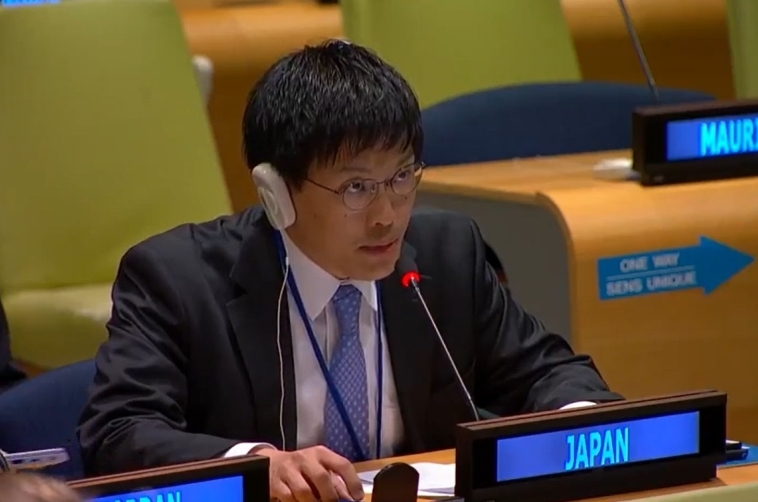第78回国連総会第6委員会「国際法委員会(ILC)報告書(第1群)」(議題79)における岡野課長補佐ステートメント
令和5年10月27日

(Check against delivery)
Thank you, Madam Chairperson,
At the outset, on behalf of the Delegation of Japan, I would like to extend our sincere congratulations on your assumption of the Chair of the Sixth Committee.
Japan also appreciates the leadership of the Chairs of the International Law Commission this year, Ms. Nilüfer Oral and Ms. Patrícia Galvão Teles, as well as the contributions of all the Special Rapporteurs and the members of the Commission.
Last year, Prime Minister KISHIDA Fumio stressed the importance of strengthening the rule of law among nations at the United Nations General Assembly. This year, the then Foreign Minister HAYASHI Yoshimasa chaired the ministerial level open debate of the United Nations Security Council on the theme of “Rule of Law among Nations” in January, and as President of the G7 this year, Japan has also emphasized the importance of the rule of law together with G7 partners.
As Article 13 of the UN Charter stipulates, the General Assembly is mandated to encourage the progressive development of international law and its codification. This mandate forms the foundations of both the Sixth Committee and the International Law Commission. These two organs continue to be indispensable precisely because they contribute to promoting the rule of law; therefore, close cooperation between them is essential in carrying out this important role.
In this respect, Japan welcomes the commemorative session planned during the 75th anniversary of the Commission next year, which will provide an opportunity to enhance dialogue between the Commission and the Member States. Japan would like to reiterate our assurance of full support and active contribution to the work of the Commission.
Before going into detailed comments on specific topics, Japan notes that the Commission added a new topic “Non-legally binding international agreements” to its programme of work. Japan looks forward to the deliberations on this topic.
General principles of law
Madam Chairperson,
Japan welcomes the adoption of the draft conclusions and commentaries thereto on “General principles of law” on the first reading. Our appreciation goes to the members of the Commission, particularly the Special Rapporteur Mr. Marcelo Vázquez-Bermúdez for his untiring contribution.
As stated in draft conclusion 2, recognition by the community of nations is essential for a general principle of law to exist. In this regard, Japan agrees with the explanation in the commentary to draft conclusion 6 that transposition of a principle common to the various legal systems of the world to the international legal system does not occur automatically.
With regard to the notion of the second category of general principles of law, namely, general principles of law formed within the international legal system, Japan notes the divergence of views in doctrine among the members of the Commission or between States on the existence of such principles and also the concerns raised regarding the methodology for the identification of such principles. Furthermore, with regard to clarification on distinction between general principles of law and customary international law, Japan hopes that further explanation will be provided in the commentaries.
Sea-level rise in relation to international law
Madam Chair,
Now, I would like to turn to the topic of sea-level rise in relation to international law. Japan commends the progress made thanks to the Commission’s continued and dedicated work on this very important topic. Since many countries including the islands States are exposed to imminent threats and various uncertainties due to sea-level rise, this topic is a pressing issue for the international community as a whole and has direct relevance to peace and security around the world.
Legal stability and predictability based on international law are the necessary foundations for States in tackling the challenges posed by sea-level rise. For this reason, the primacy of the United Nations Convention on the Law of the Sea that sets out the legal framework within which all activities in the oceans and seas must be carried out needs to be maintained. In this connection, Japan especially welcomes the progress made by the Commission on the discussion on the issue of legal stability in relation to sea-level rise.
In this regard, taking fully into account the Commission’s views and State practices such as the PIF declaration on preserving maritime zones, Japan officially adopted the position that it is permissible to preserve the existing baselines and maritime zones established in accordance with UNCLOS, notwithstanding the regression of coastlines caused by climate change.
Japan reiterates its full support for the work of the Commission and commits to work and discuss with other States toward a goal of maintaining and developing the maritime order based on international law, in particular UNCLOS.
Thank you.
